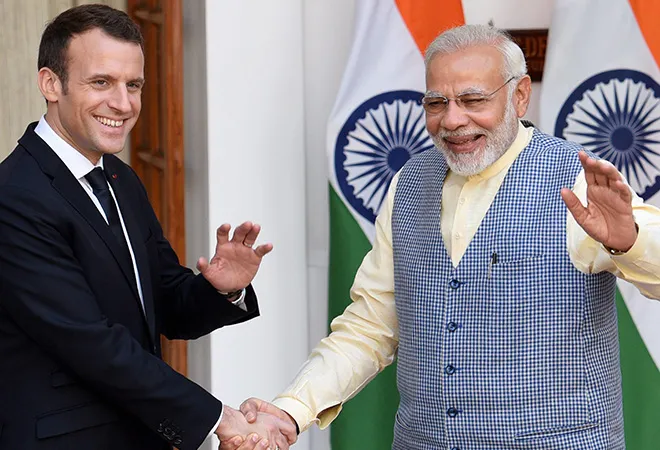The French President Emmanuel Macron’s visit has been an opportunity for India to signal its intention of restoring a balanced posture to its foreign policy, with a stress on regional security and multipolarity.
Since France sees itself as an autonomous global player, New Delhi has chosen to emphasise this by striking agreements with Paris that mirror its arrangements with the US. The reciprocal logistics support agreement and the agreement to protect classified information are similar to those arrived at with the US after long negotiations.
Indo-Pacific region
The Joint Strategic Vision for Cooperation in the Indian Ocean Region (IOR) is much like the document agreed to with the US during the Obama visit in 2015. Though the Indo-American agreement emphasises Pacific issues, the Indo-French one focuses on the IOR which is probably more practical. Looked at any way, the outcome of the Macron visit indicates that the Indo-French relationship retains both its rationale and elan.
France has begun to pay serious attention to the Indo-Pacific region after a long time. One reason for this is the Brexit induced unsettling of the European project. The other is the awareness that China is now mounting a challenge to the EU from the east where it has steadily built up important relationships with the erstwhile East European countries.
Macron’s visit to India takes place at an important juncture in the regional geopolitics. In 2016, under his Presidency, France for the first time called for European patrols in the South China Sea. The EU ignored the suggestion since it has a neutral posture on the issue, but France has teamed up with the UK and is now regularly sending naval task forces to the region. Taken in conjunction with the emergence of the Quadrilateral Grouping (Quad) this is a significant development.
Given its robust foreign policy, France has not hesitated to criticise China’s human rights record, especially the repression in Tibet, despite having significant economic interests in China. In a similar vein, it had not hesitated to criticise the US for its 2003 invasion of Iraq.
French cooperation
France is an old friend of India. Successive presidents have been chief guests at the Republic Day, the last being Hollande in 2016. Prime Minister Modi has visited France in 2015 and again in 2017. Given our focus on the US, sometimes it is useful to recall that France is a rich, highly industrialised country, with a nominal GDP higher than that of India and a permanent member of the UN Security Council. It is as much known for its civilisational contributions as its achievements in R&D and innovation.
For this reason, India has maintained a deep relationship with France, especially in the area of aerospace and nonoil energy. France has been willing to supply us systems which countries like the US hesitate on, and at the same time, it has not embargoed India on account of wars and tension. A hallmark of the level of our current relationship is the fact that India’s cutting-edge Scorpene submarine is of French origin and we have also decided to acquire a small number of the Rafale fighters.
Military presence
France is a significant Indo-Pacific power. Not many know that it actually has the largest EEZ in the world, if you take into account all its scattered island territories. In the Pacific Ocean itself, it has an EEZ is over 6 million square kms, three times larger than that of India’s. It also has significant assets in the Indian Ocean, the island of Reunion and Mayotte, as well as the so-called Scattered Islands in the strategic Mozambique channel which have no settled population but have an EEZ of 6,40,000 sq kms. For this reason, France has maintained a military presence in both the Indian and the Pacific Oceans.
India has been steadily enhancing its maritime posture in the Mozambique channel, the island states of Mauritius, Seychelles, and, most importantly in the Persian Gulf. France is a military presence in all these areas, besides its own territories, it also has a base in Djibouti, as well as the United Arab Emirates.
India, which has significant interests in the western IOR, needs to reach out to France for three reasons. First, France has common interests in fighting piracy, freedom of navigation and the general stability of the region. Second, this is a region where we have no other partner. In the eastern IOR, India has ties with the US Pacific Command. But the Americans do not deal with us through their Central and Africa Commands that takes in the Persian Gulf and western IOR. And third, the French see the IOR territories as parts of France and are not likely to walk away from the region.
This commentary originally appeared in DailyO.
The views expressed above belong to the author(s). ORF research and analyses now available on Telegram! Click here to access our curated content — blogs, longforms and interviews.




 PREV
PREV


